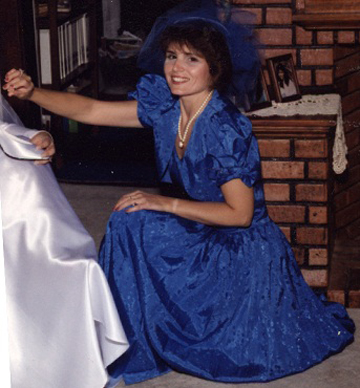Advertisement
Mandatory Sentencing: Victims Speak Out
Our Jan. 22 hour discussed the national struggle around how to justly sentence violent juvenile offenders. For many years, courts handed down mandatory life sentences without hope of parole to young adults who had committed a crime before the age of 18.
In 2012, the Supreme Court ruled such sentences should no longer be mandatory and that such sentences should be considered cruel and unusual. The court felt children’s brains were still developing and that judges should be empowered to make a judgment on a case by case basis. But what they didn’t tackle was the more than 2,500 inmates, living out life sentences without parole for crimes committed as juveniles. Did the rule apply to them? It’s a question that many states have been struggling to answer in the year since.
An important voice in the conversation is that of a victim’s family — the people who lost a love one at the hands of these offenders, who could now be facing re-sentencing hearings, and even a lifetime of parole hearings. During our hour today, we heard from three people who had lost someone at the hands of a juvenile offender. All three offenders were sentenced to the mandatory life without parole, but in the wake of these new decisions, that all may change.
PAUL DOWNING “He knew right from wrong, and there's nothing that could justify, what he did.”

On July 23rd, 1995, Janet Downing, a 42 year old mother of four, was murdered in her Somerville, Mass. home. The perpetrator, Edward O'Brien, who was 15 years old at the time of the murder, stabbed Downing 98 times. A family friend and neighbor, O'Brien had lived much of his life across the street from Janet Downing. A little more than two years later in October of 1997, O'Brien was found guilty of first degree murder and automatically given the mandatory sentence - life without parole.
Advertisement
Tom Ashbrook: What do you think of this ruling that would mean a reconsideration of the life without parole sentence of your mother's murder, Edward O'Brien?
Paul Downing: It's definitely reopening a wound for the entire family. It's a very scary thought that this person possibly could be among us again. It’s... it's not going very well with a lot of us. For a lot of people that supported us.
TA: It was a terrible murder, you were neighbors, his grandfather had been chief of police in your town - Somerville. He was only 15. A big boy, 6'4'', 250 lbs., 260 - but even for all that - he was only 15. I mean, is it a matter of justice, vengeance, what Paul, that he should be in prison for the rest of his life? When you think about this case, do you think, well maybe, maybe he'll change over 20, 30, 40, 50 years?
PD: There's nothing to excuse what he did. My mother suffered over 90 stab wounds, and it was an extreme atrocious act. From someone she knew very closely. Whether his brain was developed, or not at that point, he knew right from wrong, and there's nothing that could justify, what he did. There's just nothing to excuse it.
TA: have you heard exactly what might happen now? What will happen with the Massachusetts high court ruling?
PD: We're currently in limbo. My family won't know more till about June? I would say? Where he may be up for parole at that time. So yes, he has the ability to appeal his case, and who knows where he might go with the direction of how he might get himself out. And the thought of that - it's very terrifying.
TA: Resentencing means getting back into all of that, and it was clearly terrible. But what about - you're older now; he's older now, what about someday when he's 50 years old, when he's 60 years old, 70 years old, maybe even 80 years old? At which point you may think - well it was terrible, but that's a lot of time, let's say enough.
PD: If I can get my mother back, then maybe - I’d say okay, it's alright. But you know I'm sorry, a life was taken, a person is never going to exist again. My mom will never be alive, so fair is fair. You did what you did. You get to live still. Don’t forget that.
SEAN AYLWARD: “…the cruel and unusual punishment here is to victims and their families, not to these convicts.”

In 1992, Beth Brodie was a 15-year-old high school cheerleader in Groveland, Mass. That November, Richard Baldwin, 16, beat her to death with an aluminum baseball bat.
In 1994, Baldwin was convicted of first degree murder – with the mandatory sentence of life without parole.
Like Edward O’Brien, Richard Baldwin’s case falls under those up for resentencing in Massachusetts. Beth’s family and friends are outraged that the perpetrator of such a violent crime would have the hope of parole available to them.
Beth’s brother, Sean Alyward. called us to share his sister’s story and his feelings about the Supreme Judicial Court’s decision.
Sean Alyward: She was 15, he was 16, and she did not pursue a romantic relationship with him and he took offense to that. Throughout the course of a day, in conversations with her mutual friend, he drove to the home of a mutual friend with a baseball bat, and lured her to the home – and then bludgeoned her to death.
TA: We will remain always sorry for that whole story, how are you thinking about the Supreme Court ruling now Sean, and what ought to happen with the killer of your sister?
SA: Well what the family cannot understand is the retroactivity behind this, and I have heard the arguments in the last few minutes about it. But had the states still abided by death sentences laws, what would we do then? How far back do you go and where do you draw the line? To bring this back up and strip victims’ families of their rights or solace that they may have found since it happened, is just tragic. It’s not right; the cruel and unusual punishment here is to victims and their families, not to these convicts.
TA: It’s an absolutely heinous crime. There’s no question about it, but what about the notion of redemption over time Sean? Your sister was 15, she deserved to live, this was a 16 year old boy who did a terrible thing, what about the idea that over many years, a) there’s punishment and b) the human brain is not fully developed at 16 – there’s room for redemption – how do you think about that Sean?
SA: We’ll her brain wasn’t fully developed either, if this is the argument, yet she knew the difference between right and wrong. She didn’t do anything wrong. She was a saint. She recognized that this was not somebody she wanted to have a romantic relationship with. So in his eyes, the proper thing to do here is take somebody’s life? That’s just simply not fair, so why should he experience any of the rights and freedoms that she could have used up to this point.
…
TA: Sean, do you know what process is now underway? The Massachusetts Supreme Judicial Court has ruled on this so presumably resentencing will come to this – do you have a sense of how that will unfold Sean?
SA: We’re actually preparing for the parole now. Preparing with District Attorney Blodgett and he’s been very proactive in this, and he’s been very supportive. He’s got probably the best attorneys from his office working on our parole hearing. But it’s just unfortunate that my family is going to spend the rest of our lives preparing for these (hearings) because even if he is denied parole in this first hearing, he’s going to be up for parole in whatever the court sees is fair. Whether it’s three or five or even ten years, (we’ll be) constantly preparing for this parole.
I think the argument here should be left open for the judges in these cases. Take the mandatory out but leave (life without parole) as an option, cause in some cases these guys need to go away without the option of parole.

JEANNE BISHOP: “This sentence is merciless. It freezes in time forever something someone did at a very young age.”
But there are those who have lost love ones who have decided to support the Supreme Court’s ruling.
In April of 1990 Nancy Bishop Langert and her husband Richard were murdered in their Winnetka, Illinois home just outside of Chicago. Nancy was just 25 and pregnant with the couple’s first child. In her last moments, she left a message for her family – a heart, and the letter “U,” scribbled out in her blood.
Six months after that night, 16 year-old David Biro was arrested for the murder. He was sentenced to life with no chance of parole. Jeanne’s family was overcome with relief.
Nancy’s sister Jeanne, has spent more than 20 years since working as a public defender with Cook County (which includes the city of Chicago.) Through her work, and her faith, she decided that her sister’s killer deserves the change of hope, redemption, and mercy that comes with knowing parole is possible.
Jeanne joined us during our hour to share her sister’s story and how she came to this conclusion.
TA: do you support the Supreme Court in saying, let’s leave open a chance for redemption or not?
Jeanne Bishop: I do support that Tom, and I do because I believe that any kind of mandatory sentencing for adults or juveniles ignores the unique circumstances of the facts of the case, of the characteristics of that person. I just don’t think we can take a cookie cutter approach. And I also have to say in my own case, the young man who killed my family members received a mandatory sentence for killing my sister and her husband, but he received a discretionary life sentence for killing their unborn child. With the respect to the mandatory sentence, my family was not even allowed to do a victim impact statement at sentencing because there was not aggravation and mitigation hearing, there was no possibility for us to have input into the sentence.
TA: how has your attitude about that sentence evolved over the years if it has? Were you satisfied at the beginning, were you happy to see him put away for life, mandatory – If it’s changed why? How?JB: When he was sentenced my mother turned to me and said, “We’ll never see him again,” and I was glad of that. I wiped him off my hands like dirt. And over the years having worked as a public defender, seeing the clients that I have up close, and seeing my own thinking on things evolve, and having children, young men – boys of my own, to realize that this sentence is merciless. It freezes in time forever something someone did at a very young age. People do have the capacity for remorse – to rethink what they’re doing. And that’s true in the case of the person that took my sister’s life. He started out remorseless – denying the crime. He took the stand and blamed it on someone else. But when I got in touch with him now that he is age 40, he wrote me a 15 page letter, apologizing, confessing to the crime and kind of tracing the arch of his thinking on his crime.